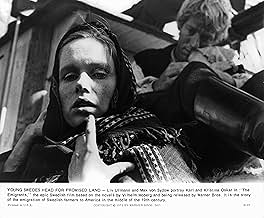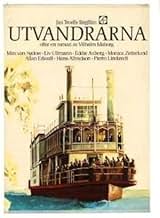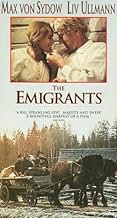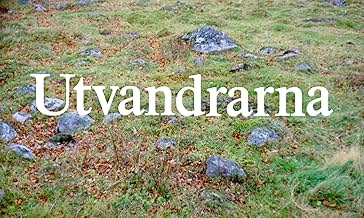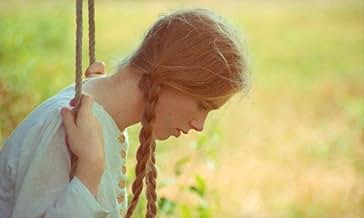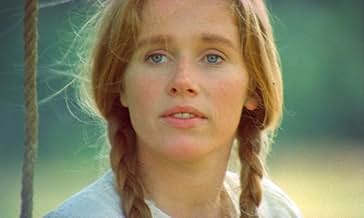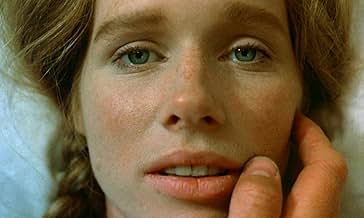Adicionar um enredo no seu idiomaAn 1840s Swedish farming family struggle with their unyielding land and decide to embark on the arduous journey to new hope in America.An 1840s Swedish farming family struggle with their unyielding land and decide to embark on the arduous journey to new hope in America.An 1840s Swedish farming family struggle with their unyielding land and decide to embark on the arduous journey to new hope in America.
- Direção
- Roteiristas
- Artistas
- Indicado a 5 Oscars
- 8 vitórias e 11 indicações no total
- Nils
- (as Svenolof Bern)
- Direção
- Roteiristas
- Elenco e equipe completos
- Produção, bilheteria e muito mais no IMDbPro
Avaliações em destaque
The Emigrants alone feels like two, or maybe even three, movies in one. Its runtime exceeds three hours, and it tells the story of a group of farmers in Sweden during the 1800s deciding to start a new life in America. This first half of the overall saga involves establishing how bad life was for a farmer in Sweden, then showing the arduous journey by boat from Sweden to America, and then finally, it spends some time with the characters as they travel further inland after setting foot in America.
It's gruelling by design, and viscerally captures how difficult such a journey would have been back during the middle of the 19th century. The section spent at sea is particularly harrowing, but I guess it has to be, and it doesn't shy away from anything when it comes to claustrophobia, seasickness, lice, terrible food, disease, and death. It makes The Emigrants a tough but compelling watch, and part of me wonders what The New Land will do to keep the stakes high, because it's hard to imagine things getting worse than that trip across the ocean (I may end up eating my words 24-48 hours from now, but we'll have to wait and see).
Not a film for everyone, but I thought it moved pretty well considering its length and slow pace. Performances were generally strong, and it had some very good visuals too. I get the sense Terrence Malick would have loved this movie, too, because I see bits of Badlands, Days of Heaven, The New World, and A Hidden Life in here at times.
There are lots of little touches in the film, such as the family's reaction to being on a train for the first time, reminding us that railroads were a monumental innovation in the 19th century. The priest who is with them along with his followers because they were persecuted in Sweden doles out some sublime thoughts, such as reminding them that even lice are god's creation and that suffering because of them allows one to understand suffering in others better and to empathize. He also dispenses a lot of nonsense, such as the idea that they'll magically understand English when they land in America per his understanding of the Bible, and in general trying to attribute everything that happens in their little lives to divine favor or displeasure operating on them in ways he's always trying to explain after the fact.
The family is incredibly naïve about planning beyond the idea of 'going to America', and their rosy optimism of all the wonderful things they would find there. It's interesting that on the one hand they find a fellow Swede in Minnesota living in what his mother sees as squalor, but on the other hand, that they're free to stake out claims to beautiful, arable land, which is hard to fathom today. They are in some sense disillusioned, but in another sense, are in a paradise of sorts. There are lots of moments where fantasy and reality meet in the film, but it's in nuanced ways and never overplayed.
It's a fantastic moment when we get a brief glimpse of slaves in chains on a steamboat, and in those poor eyes get a heartstopping reminder that to others, coming to America was a very different, horrifying nightmare of an experience. So much for the idea that the young men had read about in Sweden, that "many of the slaves have better houses, food, and circumstances than peasants in Europe." Unfortunately while we might see a few Native Americans at one of the stops, the idea that the land these people from Sweden are claiming had been inhabited by people who were going through genocide is not articulated by the film, though it is in the sequel, 'The New Land.'
In terms of production value, there is a lot to love about the realism. We're not flooded with grand images of landscapes, and even the beauty we see in the woods or fields has a natural ruggedness to it. It's a very small moment, but at one point director Jan Troell gives us the sun on the water during a very serene moment with slow undulations, which I found simply exquisite, and such a contrast to the harshness of the ocean journey. The performances from Max von Sydow, Liv Ullmann, and the rest of the fine cast are unaffected and natural. The version I saw had unfortunately been dubbed in English though, and I think seeing it in Swedish with English subtitles would have been infinitely preferable, and much more in keeping with the spirit of the film, so if it's an option for you, I would certainly seek it out.
The first part of the film details the challenges these people face that make them want to emigrate in the first place. An oppressive village hierarchy in which all laws and rules of accepted behavior are arbitrated by a self-appointed few, as well as conditions that make farming a constant struggle, leave them craving the freedoms and fertility of the mythic U.S. The second part of the film is a meticulous recreation of what the actual journey was like, including a long segment about the miseries of crossing the Atlantic Ocean (including sea sickness and lice), and the interminable trek up the Mississippi River to Minnesota once they landed. It's almost impossible to wrap your head around how frightening this entire experience would have been for them. These people knew almost nothing about the world outside of their small Swedish village (one young man doesn't even know how the ocean works and thinks they're all going to drown if the water rises) and trust themselves to strangers who don't speak their language or really have any reason to look out for their interests. It's a fascinating film and feels more like a documentary than a fictional narrative.
Unfortunately, the only version I was able to see was the dubbed one shown by TCM. I would have much preferred to see it subtitled so that I could experience von Sydow's and Ullmann's performances as they were meant to be experienced.
"The Emigrants" was nominated for Best Foreign Language Film at the 1971 Academy Awards, and then because of Oscar's weird eligibility rules popped up again a year later with four nominations, for Best Picture, Best Director (Jan Troell), Best Actress (Ullmann), and Best Adapted Screenplay. At the time, it was only the third foreign language film after "Grand Illusion" and "Z" to receive a Best Picture nomination. And the film's sequel, "The New Land," was up for Best Foreign Language Film the same year that "The Emigrants" was in the Best Picture race. Good couple of years for director Jan Troell.
Grade: A
Sad to say, because "The Emigrants" is a film that closely examines two very different cultures in an effective and insightful way. A diverse group of Swedish peasants (among them a married couple, a priest, a prostitute, and a young upstart) endure back-breaking labor in their homeland to little profit. They decide to move to the states after being influenced by the exaggerated stories spread abroad (everyone has more than enough food, everyone is filthy rich, etc.). The audience sympathizes with them not just because they endure so much in Sweden, but also because they believe the stories they hear about frontier life in America. Yes, they will obviously have to strive and struggle to survive in their new home, but they are all the more admirable because of their adherence to the American dream.
"The Emigrants" is harsh and often unrelenting in the straightforward way it depicts the realities encountered by the Swedish settlers. The scenes where they travel across the ocean in a small, cramped, and diseased ship are appropriately claustrophobic and terrifying. Later, the family at the center of the story threatens to break up when Liv Ullmann's character, a fragile young mother, loses track of her daughter while hurrying to board a steamboat.
Although most of the characters were better developed in the sequel to this film, "The New Land," Troell's story is very moving in its sincere depiction of how outsiders came to this country to pursue their hopes and dreams.
Você sabia?
- CuriosidadesWhen filming the scene towards the end, where Karl Oskar walks off to find a better place for his settlement, director Jan Troell forgot to yell, "Cut." Max von Sydow just kept walking and walking, waiting for a "cut", and nobody realized until they took lunch.
- Erros de gravaçãoOn the train west a character shows an American silver coin and yells out it has "In God We Trust" on it. The scene is the 1850s and the motto was not added to American silver coins until 1867.
- Citações
Arvid: What do you think it will cost to ship us there?
Robert: Around 200 riksdaler.
Arvid: Ya, well, might as well forget it. 200 riksdaler. I'll never have that much.
Robert: You don't have it?
Arvid: I will go anyway. We can travel to America on foot.
Robert: Nah, there's an ocean. You can't go on foot to America.
Arvid: Do you mean there is no way?
Robert: I'm afraid there is not. America is an island.
Arvid: Damned ocean.
- Versões alternativasThe USA television version, retitled "The Emigrant Saga", consists of this film plus its sequel, O Preço do Triunfo (1972), joined and re-edited together in chronological order and dubbed in English.
- ConexõesEdited into Spisok korabley (2008)
Principais escolhas
- How long is The Emigrants?Fornecido pela Alexa
Detalhes
Bilheteria
- Faturamento bruto nos EUA e Canadá
- US$ 1.156.554
Contribua para esta página


